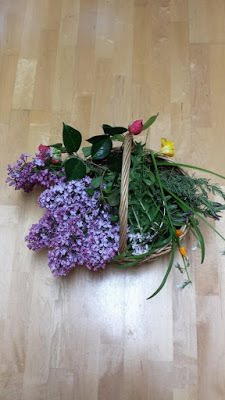Deborah J. Ross's Blog, page 50
May 18, 2020
Guest Blog: Rubi Ariadne on Surviving Covid-19
I often hear from Darkover fans around the world. There’s a large and enthusiastic group from Brazil. Some time ago I became friends with a Brazilian fan, Rubi Ariadne, who is now recovering from Covid-19. I asked her to share her experience of the virus. She wrote:
Fique doente desde o início de abril. Não contei para a maioria das pessoas porque não queria que meus amigos ficassem no pânico. Já estou melhor se comparar com o estado em que fiquei.
I've been sick with Covid-19 since the beginning of April. I didn't tell most people because I didn't want my friends to panic. I'm already much better now compared to the state I was in.
Deborah: How did you acquire the infection?Rubi: I believe I picked the virus up while shopping. Here we still didn't have the call to wear masks, and practically no one was taking any care until mid-April. Here from the beginning, we faced two serious problems: the virus, and the president [Bolsonaro] who acts against all health measures and disregards the disease. So there are a lot of people who still don't take the matter seriously today. As an example, today several people in the neighborhood are having a barbecue.
At first I didn't realize it was this disease because I have sinusitis and mild rhinitis. I thought it was an acute episode because those are frequent at this time of year and our climate contributes to respiratory problems. But I don't usually have acute episodes; in fact mine are so mild that I rarely notice them. That's why we got suspicious. I had a very high fever, which did not go away, I started to have difficulties in breathing, and then I completely lost my taste and smell. It was at that moment that we realized that this was more serious than just a rhinitis attack.
Deborah: What it’s like to have Covid-19?Rubi: I hate being idle, “standing still,” and not feeling useful all the time. So, besides all the strong and insistent symptoms, what is really difficult for me is to rest. Even getting up quickly creates results in coughing and shortness of breath.
Deborah: Was it difficult to get health care while you were sick?Rubi: In my city it is not difficult to find medical help because the governor and the mayor are working very well, despite the difficulties with the federal government. Here, fortunately, we are not short of beds yet. When the test is positive for Covid-19, we do not need to stay in the hospital. They follow each case daily by phone, e-mail, and Whatsapp. Here at home it's just me and my mom, so she was the one who took care of me.
Deborah: What advice would you offer to others, based on your experience?Rubi: We all know the preventive measures against the coronavirus, but if I could give everyone a single piece of advice on how to avoid contagion, I would say just one thing: obey the measures recommended by the specialists. They are the people who really know what they are talking about, who study hours without rest to bring us real information.
~~~~~~~~~~~~~~~~~~~~~~~~~~~~~~~~~~~~~~~~~~~~~~~~~~~~~~~~~~~~~~~

Rubi is also a talented amateur artist. You can follow her on Facebook here.

Published on May 18, 2020 01:00
May 15, 2020
Short Book Reviews: Changing the Story Halfway
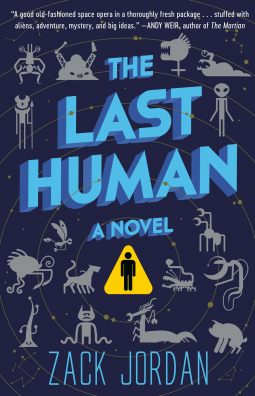 The Last Human, by Zack Jordan (Del Rey)
The Last Human, by Zack Jordan (Del Rey)I know this book has received a lot of buzz but frankly I found it disappointing and gave up near the end. The beginning was awesome: Sarya, a human teen raised by a voraciously violent, gigantic spider-with-razor-legs, lives on a space station with many other species, all joined by the Network, a galaxy-wide AI that offers communications and diplomatic services to those species who join, and ruthless segregation to those who refuse. Humankind is not among them; in fact, humans are considered to be extinct, so Sarya disguises her species. Various events catapult Sarya from her disadvantaged and frustrated life, variously aided and threatened by an array of fascinating aliens, and Sarya’s history – and the fate of humankind -- begins to be revealed.
That’s the story I was led to expect. But when Sarya is killed and her consciousness restored by the AI of all godlike AIs, I felt as if I had inadvertently stumbled into a cross between a New Age pseudoreligious tract and The Hitch Hiker’s Guide to the Galaxy. I wasn’t nearly as interested in the new story, and I found the switch from coming-of-age and girl-finds-herself to tongue-in-cheek super-cosmic saving-the-universe a definite let-down.
I also confess to a personal animus against the idea of species exceptionalism. I disagreed with the idea that humans were too dangerous a species to be allowed to exist (and that this specialness was admirable). If anything, our understanding of our place in the natural world demonstrates that our destructiveness is a bad thing, detrimental to our own survival, and that our saving grace is our capacity for compassion, not ruthlessness.

Published on May 15, 2020 01:00
May 13, 2020
Wednesday's Lilacs
Published on May 13, 2020 01:00
May 11, 2020
Author Interview: B. A. Williamson, Author of the Gwendolyn Gray Adventures
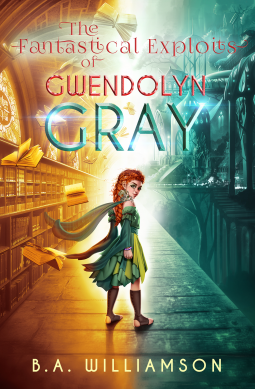 Today I chat with Brent Williamson, author of the marvelous Gwendolyn Gray books. I reviewed the first one, The Marvelous Adventures of Gwendolyn Gray here, and the hot-off-the-presses sequel, The Fantastical Exploits of Gwendolyn Gray here.
Today I chat with Brent Williamson, author of the marvelous Gwendolyn Gray books. I reviewed the first one, The Marvelous Adventures of Gwendolyn Gray here, and the hot-off-the-presses sequel, The Fantastical Exploits of Gwendolyn Gray here.Deborah J. Ross: Tell us a little about yourself. How did you come to be a writer?
Brent Williamson: Uh, boredom. I was on a charter bus taking a group of 5th graders to Washington DC. It was 2 AM, and some kid kept kicking my seat in his sleep. I had no wi-fi and no cell signal. So I got to thinking. I suddenly got that creative itch you get in those surreal moments in the wee hours in unfamiliar surroundings. My wife was pregnant with our first child, so I decided to write a bedtime story. That was the first time I ever thought of myself as a writer. Of course, later on, I looked back on the comics and musicals I had written in college, and the notebooks of songs and poems from high school, and realized that I had been writing all along. I hadn't thought of myself as a "writer," but I wasn't afraid of writing either. I had just enough experience that when I thought, "I should write a book!" I wasn't too intimidated to instantly rule it out. Also, stupid ideas seem much less stupid at 2 AM on a bus.
DJR: And in the shower!
DJR: What led you to write MG and how is it different from YA or adult fantasy?
BW: I never really thought about it. My favorite books are all mostly sci-fi and fantasy, and mostly for kids, so that's what I gravitated to. I had an idea and a character, and it wasn't until the book was done and ready for pitching that I found out that it was what was called "middle grade." From what I can tell, the big difference between YA and MG is intensity--violence, language... *ahem* relationships. You can go farther in YA. MG typically focuses on 4th-6th grade age characters, and YA focuses on older kids. You end up dealing with whole different sets of issues, because of the different challenges faced at those times of life. I picture this series as being an MG/YA crossover. Gwendolyn grows so much over the course of these stories. If you finish book two and take a glance back to the first few pages of book one, you realize just how far she's come. And in future books, I plan to follow her into the YA territory of her teen years.
DJR: That will make me, and many readers, very happy! I love watching characters mature from one story to the next.
DJR: What inspired your books, The Marvelous Adventures of Gwendolyn Gray and The Fantasical Exploits of Gwendolyn Gray? How do you see it in relation to current MG?
BW: I wanted a story about somehow who stood out. I wanted a strong female role model. And I drew on my own experience of being a misfit daydreamer with a big mouth who was always getting into trouble. The idea of making your imaginary creations come to life was just wish fulfillment from my own pre-teen years. And soon this story became a sort of love letter to the stories themselves, particularly all my favorites. Gwendolyn hops from world to world letting me play with whatever genre I like. To me, this story is really at the upper end of MG, just beyond A Series of Unfortunate Events. I see it as digging deeper, dealing with more serious themes, and having much more complex undercurrents. There's a lot that only adults are going to pick up on, but is still a fantastic pirate/fairy/monster adventure story to dive into.
DJR: What authors have most influenced your writing? What about them do you find inspiring?
BW: You'll see plenty of them reflected in this book. It's full of Easter eggs. I wear my influences on my sleeve: Lewis, Tolkein, Gaiman, L'Engle, Lowry, Applegate, Rowling, Snicket. Plenty of Douglas Adams and Terry Pratchett. I admire their wit, their prose, and their ability to put characters you truly care about into worlds you can lose yourself in and come out the other side with a completely new way of looking at life. So when I sit down to write, I try not so much to emulate their work itself, but to conjure the feeling I had of reading their books as a kid. That sense of wonder and excitement. You know, looking at that list, it explains why so many of the characters in my head have British accents...
DJR: I caught some, but not all, of the Easter eggs. I loved how the story didn't rely on recognizing them, but they definitely added a shared understanding of language and magic.
DJR: Why do you write what you do, and how does your work differ from others in your genre?
BW: I want to tell stories with meaningful characters that people can see themselves in, with struggles people can relate to. Hopefully I can give kids a place to escape to for a while, and leave with something meaningful. This series is a bit more complex than other MG books you'll find on the shelves. There's a lot more depth to it. For example, I was fascinated to see Gwendolyn develop a severe bout of depression at the start of book two. I hadn't planned that, but it was the direction she took, and I didn't fight it. I felt like the book could say a lot to a population of middle-grade kids who struggle with anxiety and depression as much as anyone, but are often overlooked. And after all, fighting wars with pirates and monsters is the sort of life-threatening trauma you don't just walk away from. And then, to my surprise, she ends up in fairy world and has a manic episode, and I discovered that Gwendolyn is, in fact, bipolar. (Like myself.) And that struggle with mental illness felt like a very important story to tell, and I loved seeing how I could work in clinically accurate information and coping strategies in a larger-than-life fantasy adventure. The best fantasy stories are all about real life, in their own way, and this was a really unique space to explore.
I agree that it's important to portray mentally ill characters as having agency and validity.
DJR: How does your writing process work?
BW: I'll let you know when I figure it out! I try to focus on creating characters that sound real, feel real, and then I'm as mean to them as possible. But I'm always cripplingly insecure about the whole thing until I find the heart of the book. You should be able to say what the book is about in one quick sentence, and it has nothing to do with pirates or monsters. Marvelous Adventures is about learning that your differences are your strengths, not your weaknesses. Fantastical Exploits takes that one step further, into embracing your flaws and using what makes you special to make the world around you a better place. Once I have the heart and the character, that informs everything else that happens, and makes sure that each scene has a purpose that somehow relates to that character's journey of realizing that particular truth. And hopefully the reader comes along for the ride.
DJR: What have you written recently? What lies ahead?
BW: I'm working on book three, which I'm currently calling The Withering Trials of Gwendolyn Gray. She's older, and dealing with the fallout from the end of book 2. Without giving too many spoilers, she's been on her own for quite a while, and it's a lot of fun to play with what sort of conflicts that can create. I'm also in editing on a paranormal mystery about a twenty-something witch who lives as an innkeeper in a bed-and-breakfast for monsters in small town Indiana. There's a murder, and she has to solve it to clear the name of her favorite vampire client. You know, that old chestnut.
DJR: What advice would you give an aspiring writer?
BW: Big picture? Keep writing. You'll need to get a lot of crap out of the pipes before the good stuff starts flowing. Successful writing can be more about who quits last, rather than who writes best. You can always learn and improve, so find those mentors, partners, workshops that will help you level up. My first book was a six-year process of writing, figuring out what was wrong, and finding someone/something that could teach me how to do it right. Rinse, revise, repeat.
Nuts and bolts? You story needs something to say. Then you need a character who wants something, and then you need to throw obstacles in their way. They have to want it so badly that the audience can't help but want it too, and obstacles so daunting that we can't help but root for them. Desire+Obstacle=story, and make sure your story has a purpose.
 B. A. Williamson describes himself as the overly caffeinated writer of The Chronicles of Gwendolyn Gray. When not mining the unfathomable depths of consciousness for new words to sling, he can be found wandering Indianapolis, directing plays, child taming, and probably singing entirely to loudly. Please direct all complaints and your darkest secrets to
williamsonwriter@gmail.com
, @BAWrites on social media, or visit gwendolyngray.com.
B. A. Williamson describes himself as the overly caffeinated writer of The Chronicles of Gwendolyn Gray. When not mining the unfathomable depths of consciousness for new words to sling, he can be found wandering Indianapolis, directing plays, child taming, and probably singing entirely to loudly. Please direct all complaints and your darkest secrets to
williamsonwriter@gmail.com
, @BAWrites on social media, or visit gwendolyngray.com.Deborah's note: Check out the cool video on Gwendolyn's site.

Published on May 11, 2020 01:00
May 9, 2020
Now (and Free) on Curious Fictions: Jaydium Chapter 3
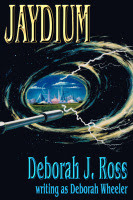 The next chapter of Jaydium is up on Curious Fictions, and it's free (all the previous chapters are, too). If you love the story, the entire ebook is only $0.99 right now from all the usual vendors. (And subscribing to my Curious Fictions page for a small amount per month would be lovely, too.)
The next chapter of Jaydium is up on Curious Fictions, and it's free (all the previous chapters are, too). If you love the story, the entire ebook is only $0.99 right now from all the usual vendors. (And subscribing to my Curious Fictions page for a small amount per month would be lovely, too.)https://curiousfictions.com/stories/3049-deborah-j-ross-jaydium-chapter-3

Published on May 09, 2020 01:00
May 8, 2020
Short Book Reviews: A Lakewalker Novella
Knife Children, by Lois McMaster Bujold (Subterranean)
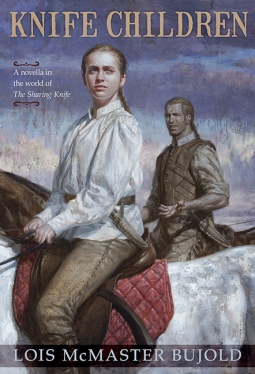
This novella is set in the world of the Lakewalkers, magically gifted rangers who protect the world against incursions of rapacious, malignant forces. Superstition and mutual distrust separate them from the rest of human settlements, so when a Lakewalker discovers he has a teenage daughter from a long ago, one-night stand with a farm woman, father and daughter must negotiate the gray areas of their disparate cultures. At first they are strangers to one another, and the daughter knows nothing of Lakewalker ways. She can no longer fit into the world she once knew, yet the insular, suspicious Lakewalkers are anything but welcoming. What is the responsibility of a parent in these circumstances? When is it right to intervene, and when is it best for everyone to let go? How much guilt must a person carry for a single mistake?
All the while, of course, new dangers pop up, and everyone has their own agenda.
I found that I liked this novella better than the novels on which it was based, although all reflect Bujold’s superb storytelling and compassionate care with her characters. It’s not necessary to have read the novels to enjoy this story (and it might be an interesting experiment to read this first, then go read the others for backstory).
Strongly recommended if you, like I, love anything Bujold writes.

Published on May 08, 2020 01:00
May 6, 2020
Wednesday's Roses
Published on May 06, 2020 01:00
May 4, 2020
Guest Blog: P.G. Nagle on the Amazing Life of Emma Edmonds
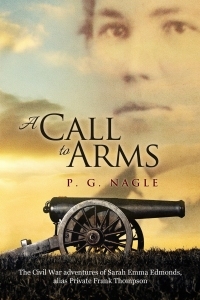 P. G. Nagle: As the world adjusts to chaos and, at best, a new lifestyle of isolation and restricted movement, I’m reminded of how Emma Edmonds must have felt in the unusual life she crafted for herself, living as a man in 19th century America. Born and raised on a farm in Canada, she learned skills such as hunting, shooting, and fishing, that would serve her well later on. As a young woman, she assumed a male persona and became very successful selling Bibles and other high-quality books door-to-door. She reveled in the freedom from societal restrictions that she enjoyed as a male, but the price was risk. If she had been discovered, she would have faced imprisonment, and likely abuse as well. She dared not tell even her closest friends; certainly not her family. Hers was at its core a life of isolation, and she chose to accept this along with the risk.Moving to America and eventually settling in Flint, Michigan, Edmonds (in her persona of Franklin Thompson) continued to enjoy prosperity, an active social life, and community including her church, of which her landlord was the pastor. Perhaps she was comfortable, having lived as a man for several years by then. Yet her comfort was soon challenged by the outbreak of secession and war.Edmonds loved her adopted country so well that she felt compelled to offer her service, and so Frank Thompson enlisted in the 2nd Michigan Volunteer Infantry. Her risk accelerated; now she was living in close quarters with a hundred men, at first in barracks, and later in camps. No doubt her ingenuity was tested. The emotional strain of being constantly on guard against detection—constantly aware of everyone around her and alert to what they might be thinking—must have been something like what we face today.I find this new awareness to be a kind of enforced mindfulness. We have no choice but to be vigilant, if we want ourselves and our loved ones—some of whom may be more at risk than ourselves—to survive this pandemic. We are aware of the consequences of each movement—the risk of touching doors, objects, things that other people have touched. The risk, even, of breathing the air that another has breathed.Edmonds must also have been acutely aware of her every movement, knowing that she might be watched with suspicion at any time. Such vigilance forces one to live in the moment. Distractions bring a heavy cost; we must keep our focus. It is a new way of being.Ultimately, Edmonds fell victim to sickness and faced a painful choice. Unable to care for herself in her illness, she had to flee in order to escape certain discovery. This cost her not only her reputation (Frank Thompson was proclaimed a deserter), but her very persona itself. Never again did she live in masculine freedom. She had to build a new life.
P. G. Nagle: As the world adjusts to chaos and, at best, a new lifestyle of isolation and restricted movement, I’m reminded of how Emma Edmonds must have felt in the unusual life she crafted for herself, living as a man in 19th century America. Born and raised on a farm in Canada, she learned skills such as hunting, shooting, and fishing, that would serve her well later on. As a young woman, she assumed a male persona and became very successful selling Bibles and other high-quality books door-to-door. She reveled in the freedom from societal restrictions that she enjoyed as a male, but the price was risk. If she had been discovered, she would have faced imprisonment, and likely abuse as well. She dared not tell even her closest friends; certainly not her family. Hers was at its core a life of isolation, and she chose to accept this along with the risk.Moving to America and eventually settling in Flint, Michigan, Edmonds (in her persona of Franklin Thompson) continued to enjoy prosperity, an active social life, and community including her church, of which her landlord was the pastor. Perhaps she was comfortable, having lived as a man for several years by then. Yet her comfort was soon challenged by the outbreak of secession and war.Edmonds loved her adopted country so well that she felt compelled to offer her service, and so Frank Thompson enlisted in the 2nd Michigan Volunteer Infantry. Her risk accelerated; now she was living in close quarters with a hundred men, at first in barracks, and later in camps. No doubt her ingenuity was tested. The emotional strain of being constantly on guard against detection—constantly aware of everyone around her and alert to what they might be thinking—must have been something like what we face today.I find this new awareness to be a kind of enforced mindfulness. We have no choice but to be vigilant, if we want ourselves and our loved ones—some of whom may be more at risk than ourselves—to survive this pandemic. We are aware of the consequences of each movement—the risk of touching doors, objects, things that other people have touched. The risk, even, of breathing the air that another has breathed.Edmonds must also have been acutely aware of her every movement, knowing that she might be watched with suspicion at any time. Such vigilance forces one to live in the moment. Distractions bring a heavy cost; we must keep our focus. It is a new way of being.Ultimately, Edmonds fell victim to sickness and faced a painful choice. Unable to care for herself in her illness, she had to flee in order to escape certain discovery. This cost her not only her reputation (Frank Thompson was proclaimed a deserter), but her very persona itself. Never again did she live in masculine freedom. She had to build a new life.We, too, are building a new life. In a few years, the stress and tragedy of the time we are now entering will be softened in memory, and eventually this time will become an interesting paragraph of history. Yet now, as we prepare for what we know will be, at best, some level of devastation, the present feels stark. The near future looms with pending grief. We know it will be hard. Our only choice is how vigilant each of us will be.
A Call to Arms by P. G. Nagle
The Civil War Adventures of Sarah Emma Edmonds, alias Private Frank Thompson

Published on May 04, 2020 01:00
May 1, 2020
Short Book Reviews: Women Take Over Henry IV
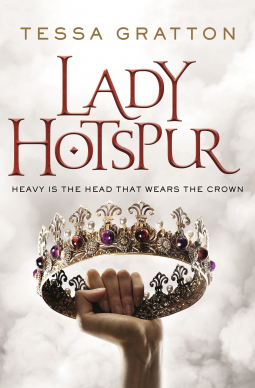 Lady Hotspur, by Tessa Gratton (Tor)
Lady Hotspur, by Tessa Gratton (Tor)The origins of Shakespeare’s Prince Hal (Henry IV, Parts I and II, Henry V) lie in late 14th/early 15th Century English history, although the Bard took considerable liberty in embellishing those events, not to mention creating a panoply of additional (and memorable) characters, Falstaff among them. The historical prince was involved in suppressing the Welsh revolt (c. 1400-1415), led his own army into Wales against Owain Glyndŵr, and fought Henry "Hotspur" Percy at the Battle of Shrewsbury (1403). It seems only fitting that since Shakespeare made free with actual history, other writers should take similar liberties both with the factual record and with Shakespeare’s inventions. Author Tessa Gratton takes both sources, turns them inside out, stands them on their heads, shoves them into a magical kingdom full of Arthurian references, and switches genders.
Lady Hotspur focuses primarily on the character of Prince Hal, in this case a woman, and Hotspur Percy, also a woman, who became passionate lovers early in the book. Politics pull them apart as the fallout from the coup that placed Hal’s mother on the throne of unfolds and the magically imbued island of Innis Lear moves toward rebellion. Banna Mora, who would have been next in line to the throne, and who has been a dear friend to Hal, ends up captive in the island kingdom of Innis Lear, then becomes instrumental in leading its struggle for independence. This may seem like a lot of action, not to mention political intrigue, but it’s spread out over many, many…many pages. Pages of character development, of shifting personal and international relationships, battles, skirmishes, magical workings, and of daily life.
I went through several phases in reading Lady Hotspur. At first I was delighted with the gender swap and the larger-than-life love affair between Hal and Hotspur. Then the pace slowed and I found myself dipping into the story, reading a little, then going off and reading something else, then coming back. Halfway through, the story caught fire for me. It drew me in, kept me turning pages, and held my rapt attention to the very end.
Novels can be “about” many things, and the forward energy can arise from different aspects. A character-driven story has quite a different “feel” from one centered on an idea (such as a mystery) or a plot/sequence of dynamic events (action/adventure). Lady Hotspur is as much about the magical sundering and eventual reunification of two lands as it is a political or military drama, or even a love story. Such a story, in which the world itself is the hero, demands a different pacing than other types of novels. Once I understood this, I was able to settle into a long, deep sojourn in this imaginary landscape.
This is apparently one of a series of Shakespearean-derived novels, which I wasn’t aware of when I read it. That said, it made no difference to me, and should pose no obstacle to the curious reader.

Published on May 01, 2020 01:00
April 27, 2020
Guest Blog: B.A. Williamson on Being a Bipolar Writer
On Being a Bipolar WriterBy B.A. Williamson
It’s pretty hard to write this right now. Each sentence is taking a conscious effort. Why? Well, I’m depressed. Unsurprisingly, given the current circumstances. Cancelling all my book launch events and conference panels didn’t help.
There’s not always a reason. Occasionally this just happens. But I can say this depression is “just a phase” without any hint of condescension, because for me, it’s true. I’m bipolar.
Sometimes I just want to lay on the couch and escape. Hours of video games are good for this, though not exactly healthy. I suffer from the emptiness and lethargy that is familiar to millions of sufferers of depression.
What’s less familiar is the other side of the coin—my manic episodes. I have unlimited energy and focus, and can dive into projects for hours on end, and the words just flow. Everything I write is the best thing anyone has ever written. (Impaired judgment is another symptom.)
Manic energy can be a superpower, if harnessed correctly. I can hit any deadline, tackle any obstacle, and breeze through it with the confidence of a narcissistic tiger owner. But as I said, it’s a double-edged sword. The crushing writer’s despair is even worse, and can wipe out all the progress I’ve made.
Writing helps. Getting things out on the page helps. During a depressive episode, it takes a monumental effort to sit down and get moving. But even as I type this, it has become easier. I do feel better. I’m not agonizing over every punctuation mark, and hey, I’ve produced about 250 words so far! Halfway there.
Routines help, too. And outlines. The less you have to think, the lower the energy it takes to get started. I don’t have to think, just check the outline, do what it says, and follow the routine. They also keep me moving at those times when I’m balanced, and don’t have that supply of manic energy to rely on.
Whenever I want to give up before I’ve even started, I tell myself to write three sentences. That’s the rule—three sentences, then you can quit. Anyone can write three sentences. My seven-year-old can write three sentences. And to this day, I’ve never stopped at three sentences. I may only get a few paragraphs, but that’s still overshooting my goal by quite a bit.
 So when my precious (fictional) girl Gwendolyn Gray started showing the same symptoms, I was hardly surprised. In fact, it fit my story very well, and I had a compelling and unique character arc. I work with middle schoolers, and they suffer from depression and anxiety at alarming rates. Anyone shocked? Think back to middle school. It’s a terrifying, stressful, horrific experience for many of us. Now we have the awareness and language to properly describe the toll it takes on our kids. But conversations about mental health are all-too-often relegated to the land of Young Adult, while our adolescents are talked down to or treated as if their problems couldn’t possibly be all that bad.
So when my precious (fictional) girl Gwendolyn Gray started showing the same symptoms, I was hardly surprised. In fact, it fit my story very well, and I had a compelling and unique character arc. I work with middle schoolers, and they suffer from depression and anxiety at alarming rates. Anyone shocked? Think back to middle school. It’s a terrifying, stressful, horrific experience for many of us. Now we have the awareness and language to properly describe the toll it takes on our kids. But conversations about mental health are all-too-often relegated to the land of Young Adult, while our adolescents are talked down to or treated as if their problems couldn’t possibly be all that bad.I felt it was really important to show a story where a character grows up, and kids could see a reflection of their own struggles. As Gwendolyn struggles with larger-than-life monsters, readers can see a reflection of their own struggles that can feel so much bigger than themselves. And as her external struggles are a metaphorical mirror for their own, her internal struggles create a much more literal parallel. Her internal reactions give them something to relate to, and see themselves taken seriously.
It’s not terribly easy writing about mental illness in a fantasy context. They don’t have the DSM 5 in Fairlyand, there’s not a lot of anti-depressants on pirate airships, and dystopian societies aren’t big on therapy. I had to find a way to clue readers in, without using labels. I didn’t want to be metaphorical—Gwendolyn suffers from a very literal bipolar disorder. But using clinical terms was out. Her depression came across very clearly, and my readers picked up on it right away. But in terms of her manic episodes, it left many of my beta readers asking, “Why is she so annoying all of a sudden? She’s not acting like herself. Why is she being so stupid and immature?”
All of which were intentional, because that’s what mania is like. So, I relied on visual cues—the fairies in my story all glow, and they’re about as manic as it gets. The more manic Gwendolyn becomes, the more she glows. And of course, just as in life, there are toxic people around her who find her much more fun when she’s out of control, and keep pushing her in that direction.
Magic should always have a downside, and her downside is that the more she relies on her magic, the more she loses control of herself. Again, this is absolutely true. The more I indulge my manic side, the worse it gets.
The lack of labels had the unexpected benefit of making her mental illness nonspecific, allowing readers to see their own experiences reflected in it, even if their struggle isn’t a bipolar disorder, but depression, anxiety, or just the hardships of growing up.
Since I can’t very well resolve her character arc with a healthy dose of therapy and well managed medications, it gave me a chance to lay out real coping strategies, or at least the ones that work for me. Gwendolyn meditates. She exercises. She shares her struggles with her friends, and rids herself of the toxic people in her life. She consciously uses positive self-talk.
At the end, she learns that these struggles are a part of who she is. They don’t make her any better or any worse than anyone else. Her manic-depressive nature is just one more piece of different in the sea of the differences that make her the unique and wonderful person she is. And in that acceptance, she finds the peace of mind she needs to manage whatever comes next. Of course, being the kind of author I am, “whatever comes next” is probably going to be pretty horrible. I’m so sorry.
It isn’t easy. I don’t always want to leap out of bed and sit down at the keyboard. But is that really all that different than anyone else? Where is the line between depression and everyday fatigue and procrastination? But that’s not really a question I need to answer. There aren’t three different versions of me, clearly delineated between depressed, balanced, and manic. I don’t have to find a label to apply to myself each day. I’m just me, with my own moods and behaviors and quirks and talents. They may swing around more than most, but I can accept that, manage it, and in the end, use it to create great things.
Maybe there’s a reason this new book is four-hundred pages long…
But I guarantee you, every word is the best word that anyone has ever written. At least, that’s what I think half of the time.
 B.A.Williamson
B.A.WilliamsonDeborah's Note: For more on writers with mental health and other challenges, check out :Jeannie Davide-Rivera on Writing From Our Strengths: Autism's Insights Into Fictional CharactersMy own Surviving A Murder: A #HoldOnToTheLight PostMy notes on a panel on "Managing a Creative Career with Mental Illness" in this blog post.A round table of support for an older writer struggling with grief, also here.

Published on April 27, 2020 01:00

